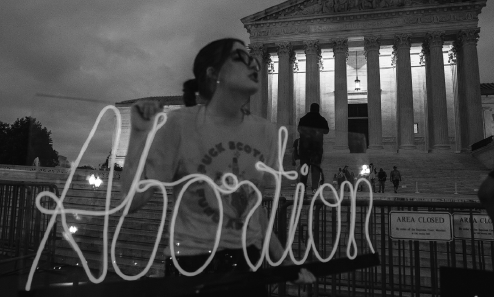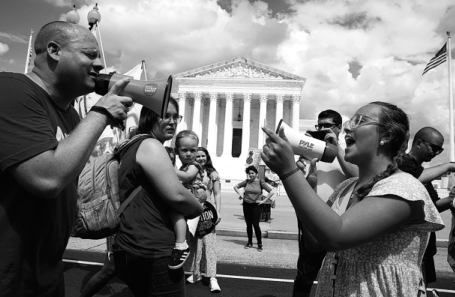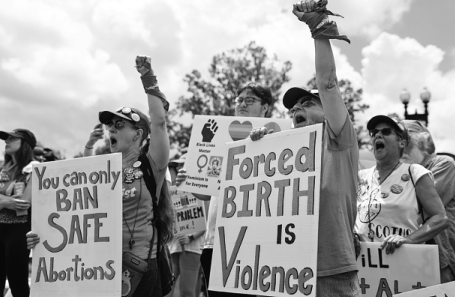Activists march on Roe vs Wade anniversary
Biden slams Republicans over abortion rights, which could emerge as key poll issue in 2024

Editor's note: Saturday marked the first anniversary of the United States Supreme Court's decision in Dobbs vs Jackson Women's Health Organization case, which overturned the landmark 1973 Roe vs Wade abortion decision. This page takes a closer look at calls across the US for attention to constitutional protections for abortion as well as reactions of leaders from both the Democratic and Republican parties.
"It is time to heed the Constitution and return the issue of abortion to the people's elected representatives."
US Supreme Court Justice Samuel Alito declared that in the majority opinion he wrote last year that ended the 50-year-old precedent Roe vs Wade and, with it, the constitutional right to abortion in the United States and turned the choice over to state legislatures.
Saturday marked one year since the court's decision. Advocates on both sides marched at rallies in Washington and across the country to call attention to the decision.
"I'm absolutely livid that people think that they can interfere with medical decisions between a woman and her doctor," said Lynn Rust of Silver Springs, Maryland, at a Women's March rally in Washington.
In Chicago, dueling rallies gathered on opposite sides of a street outside a downtown federal building. There was shouting but no reports of clashes.
In Washington, speakers from national abortion rights groups, including Women's March and NARAL Pro-Choice America, assembled in Columbus Circle to celebrate the defeat of some abortion opponents in the 2022 midterm races and to rally voters ahead of next year's congressional and presidential elections.
Across town at the Lincoln Memorial, anti-abortion groups, including Students for Life America, hosted a "National Celebrate Life Day Rally".
On Saturday, President Joe Biden issued a statement vowing to fight against the "extreme and dangerous" effort by Republicans to curb access to the procedure nationwide. He signed an executive order a day before that seeks to protect and expand access to contraception, which advocates had feared Republicans would target next as they seek to impose more restrictions.
In the year since the decision, the overturning of Roe has inflamed debate and deepened divisions along partisan, ideological and religious lines. It has — as Alito urged — moved the issue of abortion rights to state legislatures and courts to decide.
Republican-controlled legislatures in numerous states passed restrictive legislation, with near-total abortion bans now in place in 14 states. Another 11 states have enacted further restrictions on abortion, though some have been tied up in litigation. In 25 states, abortion remains generally legal up to at least 24 weeks of pregnancy.
Estimates from the Society of Family Planning, a nonprofit research organization in Colorado focusing on reproductive rights and abortion, suggest the states that instituted abortion bans had more than 7,000 fewer abortions in the six months following Roe.
There have been 40 cases of legal challenges to abortion bans in states and 29 are pending at the trial or appellate level, according to the Brennan Center for Justice at New York University's law school.
More legal constraints could be on the way.
The move from surgical to medication abortion with the use of the drug mifepristone has frustrated abortion opponents. Access to medication abortion is legal in some way in 36 states and Washington, DC. However, a lawsuit seeking to upend the Food and Drug Administration's longtime approval of one of two pills, mifepristone, is being considered by a federal court and is likely to head back to the Supreme Court. The court ruled in April that access to mifepristone may continue while litigants seek to overturn the FDA's approval for it.
"Congressional Republicans want to ban abortion nationwide, but go beyond that, by taking FDA-approved medication for terminating a pregnancy, off the market, and make it harder to obtain contraception," Biden said on Saturday. "Their agenda is extreme, dangerous and out-of-step with the vast majority of Americans."
Polls taken before and after the court's decision have showed a majority of US people favor abortion.
A poll released on June 14 by Washington-based research organization Gallup found that 69 percent of US citizens said abortion should be legal throughout the first trimester of pregnancy. Thirty-seven percent of respondents said the procedure should be legal in the second trimester, while 22 percent said the same about the third trimester.
An NBC News poll released on Thursday showed that 61 percent of all registered voters disapprove of the court's decision. That includes nearly 8 in 10 female voters aged 18 to 49, two-thirds of suburban women, 60 percent of independents and one-third of Republican voters. The poll also showed 87 percent of Democratic voters strongly disapprove of Roe's overturn, versus 52 percent of Republicans who strongly approve.
Strategists in both parties have said that higher support from women who back abortion rights helped lead to a number of prominent victories for Democrats in last year's midterm elections.
Most polls showed inflation as the No 1 issue for voters, with Republicans riding an expected victory wave, but abortion access gave Democrats wins in battleground states such as Pennsylvania and Michigan, where abortion was a top issue.
Democrats also expanded their thin Senate majority and kept the GOP's majority in the House narrow when many predicted a "red wave "of Republican victories, but the Democrats' victories helped to weaken the wave into a ripple.
The question now is whether fervor over the fall of Roe that led to the Democrats' victories can last through next year's presidential and congressional races.
Democrats have vowed to codify the right to abortion in federal law, but do not have the votes in Congress to do so.
Highlighting stakes
Anti-abortion groups want to make a federal ban a key 2024 election issue. Last week, the Democratic National Committee launched a national and local media campaign to highlight the stakes of next year's presidential election on reproductive freedom. The campaign includes billboard ads that began in Times Square and battleground states across the country. According to the DNC, the ads will highlight the contrast between Democrats' efforts to protect abortion rights and Republicans' attempts to ban abortion.
The DNC billboard campaign is part of a broader push by Democrats and reproductive rights activists to begin mobilizing voters on abortion rights.
Marjorie Dannenfelser, president of Susan B. Anthony Pro-Life America, an anti-abortion rights group in Virginia, told CBS News that the court's Roe decision was "a political earthquake, creating a unique opportunity for Democrats to motivate their depressed base and giving them the best opportunity they'll ever have to use the issue politically".In addition to the large disparity in spending on the abortion issue, key GOP candidates demoralized their own base by taking the "ostrich strategy: Burying their heads in the sand and running from the issue, allowing their opponents to define them", she said.
While Democrats have seized on abortion rights since the overturning of Roe, some Republicans seeking the presidential nomination have struggled to navigate the issue. They are seeking to appeal to the party's anti-abortion base while finding a safe political stance on an issue that an overwhelming majority of US people support.
Abortion foes are pressuring Republican candidates to back a national ban on most abortions at 15 weeks or earlier. But so far, the Republican field has offered differing positions.
Florida Governor Ron DeSantis and North Dakota Governor Doug Burgum have signed six-week abortion bans, but the former has been less clear on where he stands on a federal abortion ban. Senator Tim Scott of South Carolina initially refused to answer direct questions on what national restrictions he would support before committing to sign a 15-week ban.
Former president Donald Trump has avoided being pinned down on whether he supports a federal abortion ban and if so, after how many weeks of pregnancy he would want such a ban to take effect.
Trump has blamed Republicans' poor outcomes in last year's midterm elections on their anti-abortion platforms. He has criticized Florida's six-week abortion ban signed into law by his presidential nomination rival DeSantis, calling it too harsh. But he has also taken credit for overturning Roe, noting he nominated three of the Supreme Court justices in the decision.
Former vice-president Mike Pence called for a national 15-week abortion ban on Friday. "Every Republican candidate for president should support a ban on abortion before 15 weeks as a minimum nationwide standard," Pence said at the Faith &Freedom Coalition's Road to Majority Conference in Washington.
Dannenfelser called Pence "the definition of an unapologetic pro-life leader". She has said she will oppose any presidential candidate who does not embrace a 15-week national ban.
South Carolina Senator Lindsey Graham also called on all GOP presidential candidates to commit to a 15-week abortion ban.
"And if you cannot do that, you should not be the nominee for the Republican Party," Graham said at the conference.
A number of Republican hopefuls were set to speak at the evangelical summit this weekend, including Trump, who was set to headline an evening gala.
Ralph Reed, founder and chairman of the Faith & Freedom Coalition, said that Republican presidential candidates need a "testosterone shot" in order to fight harder for abortion bans.
Softening stance
However, many Republicans want to soften the prevailing stance on the issue to try to win over swing voters in competitive elections.
"I feel like (the) majority of the Republican field so far is catering to the far right of the party because obviously a nationwide abortion ban is what the base wants," said Sarah Matthews, who served as a former White House deputy press secretary in the Trump administration.
"It might serve them well in a primary, but whoever is the nominee, if you take this really harsh, restrictive stance on abortion, then it's just going to come back to hurt you in the general."
Meanwhile, some Democratic governors are trying to protect access to abortion.
In California, Governor Gavin Newsom signed a law on Friday protecting non-California residents seeking reproductive healthcare in the state. It also protects anyone performing, assisting or receiving an abortion in the state from any potential civil action originating outside the state.
Minnesota Governor Tim Walz issued an executive order on Saturday providing similar protections. "Our administration is doing everything we can to protect individuals' right to make their own healthcare decisions," he said in a statement.
Also on Friday, Arizona Governor Katie Hobbs signed an executive order to protect anyone involved with a legally obtained abortion from prosecution. The order bans local prosecutors from bringing abortion-related charges and state agencies from assisting in any criminal investigations without a court order.
Governor Kathy Hochul of New York state signed a law on Friday to protect doctors in the state who prescribe abortion pills to patients in states where the procedure is outlawed.
"Extremist lawmakers in other states can stop their healthcare providers from supplying abortion pills. If that's your state, I feel sorry for your constituents. But they can't stop us. They can't stop our providers," Hochul said at a bill signing ceremony.
Agencies contributed to this story.



Today's Top News
- Book on Confucianism launched in Brussels
- Right track for China-ROK ties lauded
- Nursery rooms help fathers take part in parenting duties with more ease
- Innovation key to cultivation of growth drivers
- Spokeswoman: Separatism doomed to fail
- Recall vote result resounding failure for DPP's political manipulation efforts






























